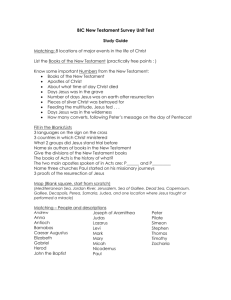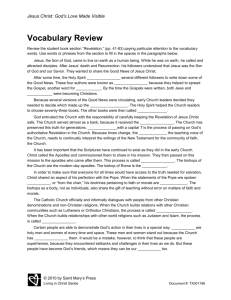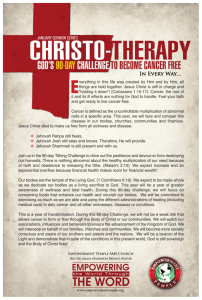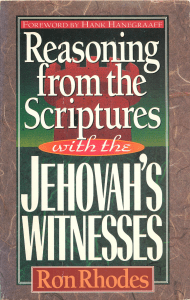Sunday School handout – The Apologists
advertisement
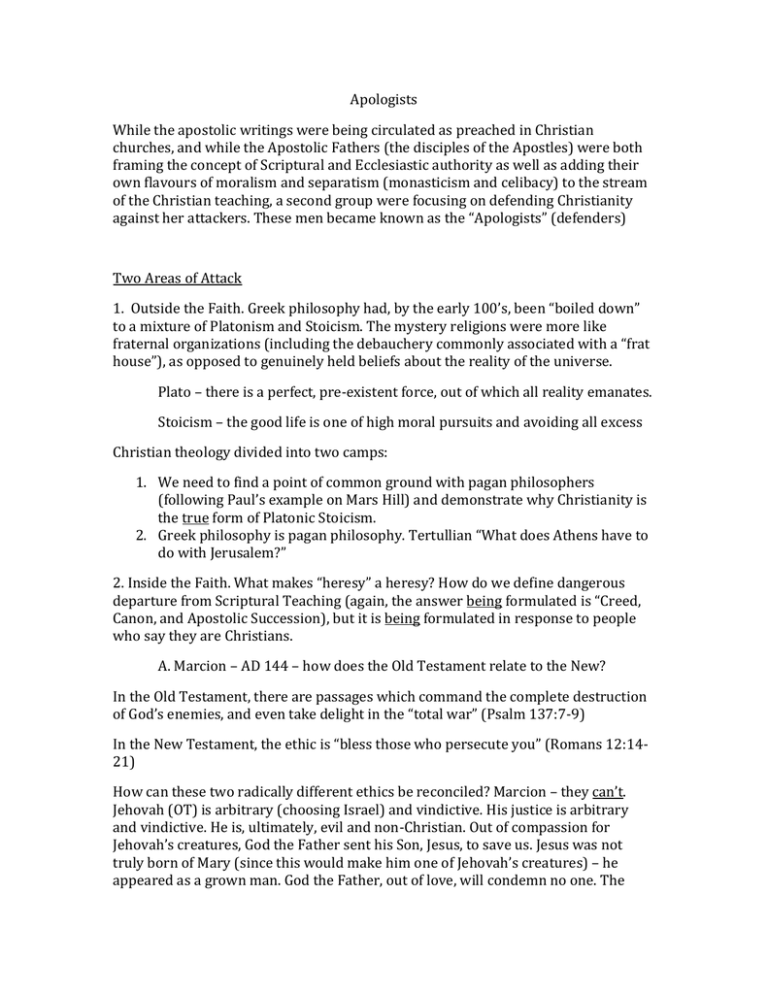
Apologists While the apostolic writings were being circulated as preached in Christian churches, and while the Apostolic Fathers (the disciples of the Apostles) were both framing the concept of Scriptural and Ecclesiastic authority as well as adding their own flavours of moralism and separatism (monasticism and celibacy) to the stream of the Christian teaching, a second group were focusing on defending Christianity against her attackers. These men became known as the “Apologists” (defenders) Two Areas of Attack 1. Outside the Faith. Greek philosophy had, by the early 100’s, been “boiled down” to a mixture of Platonism and Stoicism. The mystery religions were more like fraternal organizations (including the debauchery commonly associated with a “frat house”), as opposed to genuinely held beliefs about the reality of the universe. Plato – there is a perfect, pre-existent force, out of which all reality emanates. Stoicism – the good life is one of high moral pursuits and avoiding all excess Christian theology divided into two camps: 1. We need to find a point of common ground with pagan philosophers (following Paul’s example on Mars Hill) and demonstrate why Christianity is the true form of Platonic Stoicism. 2. Greek philosophy is pagan philosophy. Tertullian “What does Athens have to do with Jerusalem?” 2. Inside the Faith. What makes “heresy” a heresy? How do we define dangerous departure from Scriptural Teaching (again, the answer being formulated is “Creed, Canon, and Apostolic Succession), but it is being formulated in response to people who say they are Christians. A. Marcion – AD 144 – how does the Old Testament relate to the New? In the Old Testament, there are passages which command the complete destruction of God’s enemies, and even take delight in the “total war” (Psalm 137:7-9) In the New Testament, the ethic is “bless those who persecute you” (Romans 12:1421) How can these two radically different ethics be reconciled? Marcion – they can’t. Jehovah (OT) is arbitrary (choosing Israel) and vindictive. His justice is arbitrary and vindictive. He is, ultimately, evil and non-Christian. Out of compassion for Jehovah’s creatures, God the Father sent his Son, Jesus, to save us. Jesus was not truly born of Mary (since this would make him one of Jehovah’s creatures) – he appeared as a grown man. God the Father, out of love, will condemn no one. The only “Biblical” books are the letters of Paul & Luke – all else is either a direct product of Jehovah/Jewish writing, or is permeated with Jewish thought. B. Gnosticism – existed prior to Christianity, as the ethic of Plato, and was widely accepted by both Platonists and Stoicists. From Greek “gnosis” or “knowledge” All matter is both evil and essentially unreal. We are spirit beings, trapped in matter – exiled from our true home. The Supreme Being created a number of Sprit Beings. One of these, Wisdom, also wanted to do her own creating and produced an abortion – this world. This world is an abortion of the spirit, and we are exiles here Since Jesus Christ is a heavenly messenger, he cannot have had a body like ours (matter is intrinsically evil). Some taught that Jesus Christ was a ghost-like figure. Others taught that “Christ” came upon “Jesus” (the man) at his baptism and left him at the crucifixion (“My God, my God, why have you forsaken me?” – Matt. 27:45,46) Ethic – divided into 2 camps: either extreme asceticism ( your spirit should completely control your body) or extreme licentiousness (your body and its actions are irrelevant). John counters this heresy directly in 1 John 1:1-4; Gospel According to John 1:14,15 * Ultimately, these 2 foundational heresies grow out of 2 problems – rationalism (Marcion) and syncretism (Gnosticism) – which continue to plague the church through the ages Now, look back at the Apostles’ Creed – AD 150 “I believe in God the Father, maker of heaven and earth, and in Jesus Christ, his only Son, our Lord” – directly opposed to Marcionism ( The Father made heaven & earth – not “Jehovah”) “Who was conceived by the Holy Spirit, born of the Virgin Mary, suffered under Pontius Pilate, was crucified, dead, and was buried. He descended into hell. The third day he rose again from the dead, ascended into heaven and is seated at the right hand of God the Father Almighty. From thence he will come to judge the quick and the dead” – directly opposed to Gnosticism, as it clearly draws the physicality of Jesus Christ from conception to Second Coming While the New Testament Epistles and the Church Fathers were largely writing to specific situations, heresies (Marcionism and Gnosticism) were challenging the church: What is the larger body of doctrine, and how do we engage the world? Four major figures in the era of the Apologists: Justin Martyr – AD 140 – “First Apology” 1. Christians should not be persecuted as atheists, since they do believe in God – just not the same “gods” of the Roman Empire 2. The Christians are not looking for political power, but are citizens of another kingdom: a. First Apology, ch. 11 b. “ And when you hear that we look for a kingdom, you suppose, without making any inquiry, that we speak of a human kingdom; whereas we speak of that which is with God, as appears also from the confession of their faith made by those who are charged with being Christians, though they know that death is the punishment awarded to him who so confesses. For if we looked for a human kingdom, we should also deny our Christ, that we might not be slain; and we should strive to escape detection, that we might obtain what we expect. But since our thoughts are not fixed on the present, we are not concerned when men cut us off; since also death is a debt which must at all events be paid.” 3. In the context of Christian opposition to exposing babies, ch. 29 – Justin Martyr reflects the growing position of celibacy as the “higher” calling a. And again [we fear to expose children], lest some of them be not picked up, but die, and we become murderers. But whether we marry, it is only that we may bring up children; or whether we decline marriage, we live continently. And that you may understand that promiscuous intercourse is not one of our mysteries, one of our number a short time ago presented to Felix the governor in Alexandria a petition, craving that permission might be given to a surgeon to make him an eunuch.” 4. Chapters 31 – 53 focus on the Old Testament pointing us toward Christ, and Christ’s fulfillment of key prophecies – his rejection, his humiliation, his exaltation 5. Plato (the father of Greek philosophy) is absolutely dependent upon Moses a. Chapter 59 b. “And that you may learn that it was from our teachers— we mean the account given through the prophets— that Plato borrowed his statement that God, having altered matter which was shapeless, made the world, hear the very words spoken through Moses, who, as above shown, was the first prophet, and of greater antiquity than the Greek writers;…” Iraneus of Lyons – born around AD 130, pastored the congregation in Lyons, France 1. Primarily sees himself as a pastor – uses shepherd imagery throughout 2. Demonstration of the Apostolic Faith – first “Systematic Theology” Foundation of Christianity: 5. This then is the order of the rule of our faith, and the foundation of the building, and the stability of our conversation: God, the Father, not made, not material, invisible; one God, the creator of all things: this is the first point of our faith. The second point is: The Word of God, Son of God, Christ Jesus our Lord, who was manifested to the prophets according to the form of their prophesying and according to the method of the dispensation of the Father: through whom all things were made; who also at the end of the times, to complete and gather up all things, was made man among men, visible and tangible, in order to abolish death and show forth life and produce a community of union between God and man. And the third point is: The Holy Spirit, through whom the prophets prophesied, and the fathers learned the things of God, and the righteous were led forth into the way of righteousness; and who in the end of the times was poured out in a new way upon mankind in all the earth, renewing man unto God. note “at the end of times…in the end of times” language – this will become controversial soon! Overall flow of history – God’s plan of redemption, culminating in the Incarnation 46. He it is who spake with Moses in the bush, and said: Seeing have I seen the affliction of my people that is in Egypt; and I am come down to deliver them. He it is who came forth and came down for the deliverance of the oppressed, bringing us out from the power of the Egyptians, that is, from all idolatry and impiety; and delivering us from the Red Sea, that is, delivering us from the deadly confusion of the Gentiles and the grievous vexation of their blasphemy. For in them the Word of God prepared and rehearsed beforehand the things concerning us. Then He set forth in types beforehand that which was to be; how in very truth He has brought us out from the cruel service of the Gentiles, and a stream of water in the desert has He made to flow forth in abundance from a rock; and that rock is Himself; and has given twelve fountains, that is, the teaching of the twelve apostles. And the obstinate unbelievers He brought to an end and consumed in the wilderness; but those who believed on Him, and in malice were children, He made to enter into the inheritance of the fathers; whom not Moses, but Jesus puts in possession of the heritage: who also delivers us from Amalek by the expansion of His hands, and brings us to the kingdom of the Father. Mankind is to be instructed by the “two hands” of God – the Word and the Spirit Clement of Alexandria


